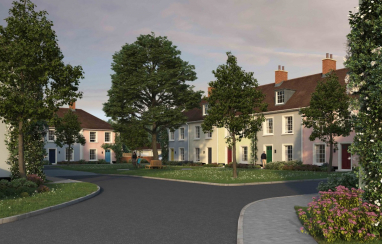
Low carbon energy network to power Hampshire development
A huge 6,000-home development in Hampshire is to use the UK’s largest water-source low carbon heating and cooling network.
The low carbon energy network will serve 15,000 residents as well as commercial premises and community buildings at Welborne Garden Village.
First-of-its-kind technology will initially supply 700 new homes, commercial premises and community buildings in the first phase of the development.
As Welborne expands, it is planned that the network will supply all 15,000 residents in 6,000 new homes with heat, hot water and cooling.
Buckland Development, the master developer of the new community, worked closely with Portsmouth Water to understand the feasibility of using reservoir water to provide heating and cooling for homes, which led them to commission independent utility infrastructure owner and operator, Last Mile, to deliver the sustainable energy network.
The technology is being designed and built by Rendesco and will draw water from Portsmouth Water’s underground Hoads Hill Reservoir, making it significantly more efficient than air source heat pumps due to the more stable and higher average temperature of the reservoir.
It will emit 90% less CO2 emissions than a gas boiler and 50% less than air source heat pumps.
It is also cheaper for customers, saving an average three-bedroom house around £160 per year compared with an air source heat pump.
A unique feature of the network is its ability to provide cooling in the warmer months by reversing the process and expelling heat back into the reservoir, making it climate change resilient.
The network also includes an innovative energy exchange function which allows heat to be transferred between homes and other buildings.
When one building is cooling, it can supply its excess heat to other buildings in the network which can then be used for central heating or hot water.
As a result, the complete network has the potential to save over 272,000 tonnes of carbon in the first 25 years of operation, compared with gas boilers, which adds up to the emissions of more than 33,000 average homes.
Last Mile Heat, the Heat Trust registered low-carbon heat supplier, is an innovative joint venture between Last Mile and Rendesco and will own the Welborne network.
The announcement comes as housing developers adjust to the Future Homes Standard which is likely to ban gas boilers in new build homes from 2025, requiring them to be equipped with low carbon forms of electrified heat such as heat networks or heat pumps.
The government’s consultation on the Future Homes Standard opened in December reaffirming its commitment to electrified sources of heat.
Mark Thistlethwayte, chairman, Buckland Group, said: “Welborne is a new generation sustainable garden village, so our residents and businesses will rightly expect their buildings to be energy efficient and climate-change resilient.
“Partnering with Last Mile Heat and Portsmouth Water we are delivering the largest water-source heating and cooling network in the UK, which will cut carbon emissions and reduce people’s energy bills.
“Being involved in Welborne for the long-term both financially and practically, Buckland is taking a different development approach to mainstream housebuilders.
“We are designing and developing the community holistically, so we can take strategic decisions to invest in innovative technology and deploy it at scale.”
Alastair Murray, director, Last Mile Heat, added: “We’re proud to be partnering with the Welborne Garden Village development to deliver this exciting and innovative clean energy network to its residents and commercial tenants.
“It proves undoubtedly that heat networks are the best low-carbon heating and hot water solution for homeowners, businesses and developers.
“Rendesco, together with Last Mile Heat, relishes the opportunity to work with ambitious developers, such as Welborne, who put long-term sustainable living at the forefront of their decision making.
“With the Future Homes Standard now confirmed for 2025, we are seeing a huge gap opening up between the housebuilders that are embracing low carbon heating, for the benefits that it offers their customers, and those that are not.
“This project is a template for future housing developments of all shapes and sizes and gives developers the confidence to design their projects, no matter how big or small, around our low carbon heat networks.”